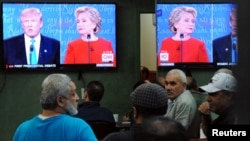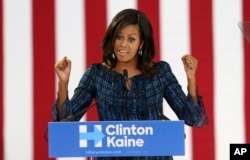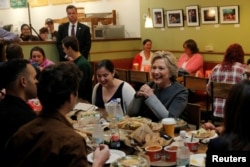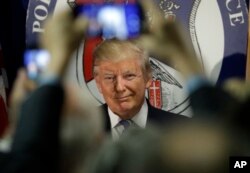U.S. presidential candidates Hillary Clinton and Donald Trump headed Wednesday to political battleground states they need to win the November 8 election.
Clinton is campaigning in the northeastern state of New Hampshire with her one-time rival for the Democratic presidential nomination, Vermont Senator Bernie Sanders, as she looks to woo younger voters who were attracted to his candidacy in the months-long campaign she eventually won. Clinton's daughter, Chelsea, is campaigning for her in the key mid-Atlantic state of North Carolina, where Clinton and Trump, the Republican nominee, have made numerous appearances.
First lady Michelle Obama appeared in a new Clinton campaign ad, telling voters that she supports the former U.S. secretary of state because "Hillary will be a president our kids can look up to." Obama, without mentioning the brash Trump's name and his campaign taunts against Clinton, said, "Our children watch everything we do, and the person we elect as president has the power to shape their lives for years to come."
The first lady is campaigning for Clinton in yet another important election state, Pennsylvania, in the eastern part of the country, with stops in its two biggest cities, Philadelphia and Pittsburgh.
In Philadelphia, she told a group of young voters, "I'm inspired by her persistence, her consistency, by her heart and by her guts."
President Barack Obama, a staunch Clinton supporter, told a radio interviewer that he is frustrated that voters have not embraced Clinton's candidacy as much as he would like. He suggested that one reason is that Clinton is a woman in a country that has never had a female president.
Trump, the Republican nominee, is headed to Chicago, the country's third-biggest city and a Democratic stronghold, where he has little chance of winning. Later he is appearing at rallies in two nearby closely contested states, Iowa and Wisconsin.
Polls shows Clinton edge
U.S. presidential elections are not decided by a national popular vote, but rather by individual races in the 50 states, with each state's importance in the overall outcome weighted by its population. Winning presidential candidates have to amass a majority of 270 votes in the 538-member electoral college based on the state-by-state results.
With about 40 states likely to vote the way they traditionally do, for the Republican or Democratic candidate no matter who it is, Clinton and Trump are focusing their attention on the remaining 10 where the outcome is in doubt.
After Monday's debate, independent political analysts widely gave Clinton the edge after she kept Trump on the defensive, attacking him for not releasing his U.S. tax returns for public scrutiny, his lengthy history of slurs against women, and his years-long campaign to try to prove the debunked claim that President Obama was born in Kenya and is not a U.S. citizen.
In the immediate aftermath of the debate, watched by a record of more than 80 million Americans, political analysts suggested that Clinton, locked in a tight race with Trump, could pick up an additional two percentage points or more of support. The Politico/Morning Consult poll, which had Trump ahead by one point before the debate, said its first post-debate polling now showed Clinton with a three-point edge, a four-percentage-point gain.
Trump, Clinton reaction
Trump's advisers say they are frustrated by his debate performance and intend to try to get him to practice more before his next encounter with Clinton set for October 9, the second of three planned debates. But Trump resisted intensive preparation before the Monday matchup, the Trump aides told The New York Times.
In the face of the wide assessment that Clinton had bested him in the debate six weeks before the election, Trump said on his Twitter account that he raised $18 million for his campaign in the hours after the debate.
Clinton said after the debate, "I felt so positive about it. The real point is about temperament and fitness and qualification to hold the most important, the hardest job in the world." She said there were "some very clear differences" between her and Trump.
He told a campaign rally in Florida, "She's the candidate of yesterday, and ours is the campaign and we're the people of the future. Her only experience has been a failure."
A third-party candidate, Libertarian Gary Johnson, who is collecting single-digit support in the presidential race, wrote in a New York Times opinion article that "the America I know wasn't on the television screen" at the Clinton-Trump debate.
"Americans want to be able to choose a president who is capable of reason, of learning from failures, and of telling them the truth, even when it hurts," Johnson said. "Most of all, they want to choose a president who will adhere to the Constitution and will make government live within its means."
In the weeks before the debate, Johnson did not meet the 15 percent national polling threshold to be invited to the debate, but his name will be on the ballot in all 50 states.




